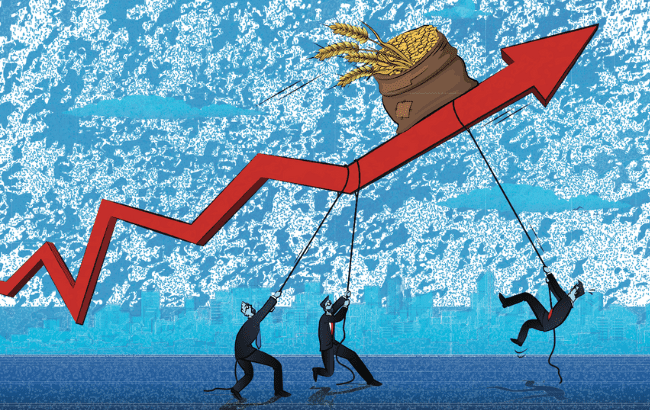This website uses cookies so that we can provide you with the best user experience possible. Cookie information is stored in your browser and performs functions such as recognising you when you return to our website and helping our team to understand which sections of the website you find most interesting and useful.
The impact of rising inflation on spirits
By Melita KielyA perfect storm of inflation and tax rises is hitting the spirits industry around the world. The Spirits Business asks whether there is any relief in sight.

Since the second half of 2021, rising inflation has been a major topic worldwide. Inflation levels started climbing in the aftermath of the Covid‐19 pandemic, as the production and transport that was halted in 2020 took time to return to normal levels – all while demand increased. Meanwhile China, the world’s second‐largest economy, continued with its zero‐Covid strategy, sending cities such as Shanghai back into repeated lockdowns, disrupting production.
In February 2022, Russia’s invasion of Ukraine threw cold water on the worldwide recovery from the pandemic, spurring global inflation, with materials such as wheat and corn grossly affected, as were energy sources such as gas. Inflation has been acutely felt throughout the first half of 2023, with energy costs remaining elevated for many markets, putting financial strains on companies and consumers alike.
Falling exports
The impact of inflation on the spirits industry became clear in June when the Fédération Française des Spiritueux (FFS) revealed exports of French spirits fell by 20% during the first quarter of 2023 as a result of increasing inflation. The body cited the war in Ukraine as a key contributor, causing rising production costs – with some costs, such as glass, doubling. Inflation has caused price increases in the majority of industries, and consumers have been tightening their belts as what has been dubbed the cost‐of‐living crisis has taken hold.
Jean‐Pierre Cointreau, president of the FFS, said: “While companies in the sector showed temperance by limiting requests for price increases at the height of the 2022 crisis, the commercial sequence at the start of 2023 was calamitous for our sector, which was effectively unable to pass on 18 months of production‐cost increases.”
French spirits exports had been accelerating in 2022, according to FFS, with value rising faster than volume at 11.7% to €5.4 billion (US$5.9bn), compared with 2.3% volume growth to 55.8 million cases.
If this is the situation in France, how are other markets faring as inflation continues to bite? “Like most – if not all – businesses, the Scotch whisky industry has seen the impacts of high inflation, particularly in the cost of production,” said Graeme Littlejohn, director of strategy and communications at the Scotch Whisky Association.
“The biggest increase has been the surge in energy costs over the past year, which impacts everything from cereals and glass, and, of course, the use of energy for distillation. The size of increase has varied between companies but many have seen the costs double. The impact of inflation is stifling growth, and additionally means that Scotch whisky distillers are unable to invest in decarbonising our industry, or growing our exports in key global markets.”
Last year delivered record exports for Scotland’s native spirit, up by 37% on 2021, and surpassing £6bn for the first time. Littlejohn noted that although the depreciation of sterling has “partially mitigated the inflationary impact on Scotch whisky prices in our global markets, consumers’ purchasing power is being squeezed”. It remains too early to tell, however, what impact this could have on 2023’s figures, he added.

Delicate moment
Spirits Europe supports Littlejohn’s observations, confirming that the impact of inflation on household incomes is being felt across the continent. The trade body shares some optimism, as it believes inflation rates will fall slightly as autumn approaches.
However: “The consumption climate will take a much longer time to pick up again,” warned Ulrich Adam, director general, Spirits Europe. “At such a delicate moment, and to support producers, retailers, and consumers, it will be important to avoid any additional cost increases, for instance, through higher tax rates.”
Unfortunately for spirits brands in the UK, 1 August marked the start of a 10.1% alcohol duty increase in line with inflation.
Adam advised: “Tax increases risk prolonging the current crisis. In the worst case, they will exert a boomerang effect by reigniting inflationary pressures and reaggravating the current cycle of ‘stagflation’. What seems clear already is that triggering price hikes at such an economically sensitive point in time will likely turn out to be an unfortunate antidote to strengthening consumer confidence, industry resilience and promoting a quick recovery.”
It is, however, a different story in the US. “In the year to date, spirits exports through May 2023 rose by 43% to nearly US$1bn,” said Hasan Bakir, director economic studies for the Distilled Spirits Council of the US (Discus). Bakir noted that “strong demand” for American spirits had managed to offset negative impacts of high inflation.
“Even in 2022, when overall inflation averaged around 8%, prices for spirits consumed at home rose by only 1.5%,” Bakir added. Nevertheless, he cautioned that if inflation rose any higher, it could result in reduced consumer‐purchasing power. To support distillers as they grapple with inflation rates, Discus urged the US government to create a “level playing field” between beer, wine and spirits.
“Federal excise tax on distilled spirits is more than twice as high on beer, and three times as high as the tax on wine,” Bakir said. “Spirits are also subject to higher taxes in many states. And due to the restrictions on off‐premise sales of spirits, beer is sold in 3.5 times more retail outlets than spirits. That translates to 186,000 more stores.”
Access to aid
The argument is similar in Scotland and the UK, as previously highlighted by Littlejohn in regards to the UK government’s business‐energy‐relief scheme. Granting distillers access to aid such as this would go a long way in helping companies remain competitive in an increasingly challenging environment.
“The industry, and consumers who choose to drink spirits, continue to pay over the odds. This will get even worse as the 10.1% duty increase comes into effect,” Littlejohn said. “In a cost‐of‐living crisis, spirits producers and consumers are seeing the competitive disadvantage widen in yet another hammer blow to an industry that already pays more in tax than any other alcohol category.”
The International Monetary Fund also believes global inflation will fall in 2023, but as past predictions have shown, recovery is not guaranteed to be a linear journey. It is unclear how inflation will continue to affect the international trading of spirits for the remainder of the year, and beyond.

